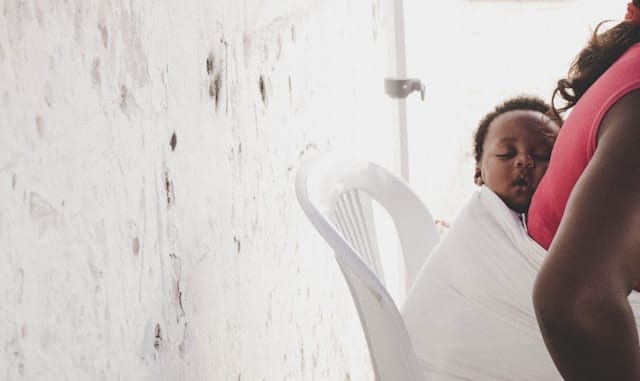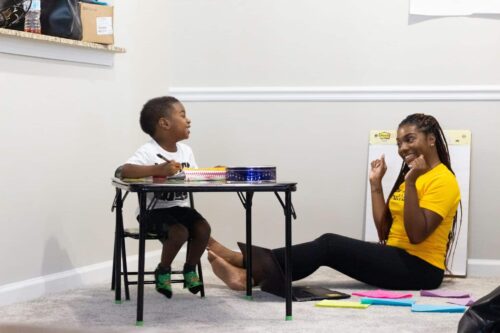Grace Adebayo often lies awake at night, staring at the ceiling while the rest of her household sleeps. A single thought pierces her like a thorn:
Who will love David when I’m gone?
It’s not just a question, it’s a fear that follows her everywhere. On her morning commute. In meetings. In church pews. At family gatherings.
At 37, Grace is a successful banking executive, a wife, and the mother of four beautiful children. Yet her world was completely redefined the day autism walked into her life.
The Miracle She Prayed For
Grace remembers the silence of those early years of marriage. Two years passed without the cry of a child, and with it came the whispers of relatives, the probing questions at weddings and family functions, and the hidden tears on her pillow. She fasted, prayed, sowed seeds in faith.
Then her miracle arrived.

David was born healthy, with a full head of hair and a cry so loud it felt like an answered prayer. “I would just stare at him for hours,” Grace recalled, her voice softening. “Sometimes I’d place his tiny fingers against my lips and whisper thank You. He was everything I had asked God for.”
But by 18 months, shadows crept into the light. David didn’t babble “mama” or “dada” like the other children at playgroup. At birthday parties, while others ran and laughed, he would sit quietly, lining up toy cars in perfect, meticulous rows. Her mother-in-law waved it off , “boys are just slower”, but Grace’s spirit was restless.
Something wasn’t right.
The Diagnosis That Shattered Her
The confirmation came when David was three. The sterile walls of Lagos University Teaching Hospital seemed to close in as the doctor said the words: autism spectrum disorder.
Grace walked out in a daze, holding the piece of paper that changed her world. She sat in her car for hours, tears flooding her face. “I wasn’t ashamed,” she said. “I was terrified. Would my son ever call me mama? Would he hug me? Would he make friends?”
At the time, she was pregnant with her second child, a season that should have been filled with joy. Instead, fear lodged itself in her chest, heavy and unrelenting.
The Blame, the Whispers, the Guilt
In Nigeria, people demand explanations. And Grace heard them all.
“It’s vaccines.”
“You worked too hard when you were pregnant.”
“This one is spiritual.”
The harshest words came from her husband’s aunt: “In our family, we don’t have such children. It must be from your side.”
Every night, Grace replayed her pregnancy like a crime scene, looking for the mistake. The malaria drugs. The late nights at work. Her wavering prayer life. Did I fail him? she asked herself. “I even wondered if maybe I didn’t pray enough,” she admitted in a whisper.
Love Under Pressure
Marriage, already a fragile balance, began to buckle under the weight of autism.
Her husband, Tunde, adored David , but adoration doesn’t always mean understanding. He grew frustrated when David ignored instructions, convinced it was stubbornness, not neurology. Their conversations shrank into transactions: “Did you pay the therapist?” “What time is his appointment?”
The breaking point came when Tunde suggested sending David to the village for spiritual deliverance. Grace’s eyes flashed as she recalled her words: “Accept your son as he is, or lose us both.”
Counseling helped them find a fragile truce, but scars linger. Autism doesn’t just test parents; it tests marriages.
Autism doesn’t just test parents; it tests marriages. Share on XChurch and the Lonely Pew
For Grace, church used to be her refuge. But with David, it became another battlefield.
Well-meaning members offered advice cloaked in pity.
“Fast more for him.”
“There’s a prophet in Ibadan.”
“It’s a generational curse.”
One Sunday, David’s joyful humming during children’s church was deemed “disruptive.” Grace was asked to wait outside. She sat in her car weeping, the words cutting into her soul:
If God gave me David this way, why does His house reject him?
After trying four churches, she finally found one that didn’t see David as a problem but as a child: beautifully, wonderfully made.
The Cost of Hope
Autism in Nigeria isn’t just emotional, it’s financial warfare.
Speech therapy: ₦10,000–₦15,000 per session, twice a week.
Occupational therapy: ₦10,000–₦20,000 weekly.
ABA therapy: ₦15,000–₦25,000 per session, 2–3 times weekly.
School for Children with Disabilities: from ₦250,000 per term.
Grace calculated once, over ₦200,000 every month. Even with her good salary, it felt like climbing a hill barefoot. She sold jewelry, borrowed from her cooperative, resold wholesale goods just to keep therapy going. One evening, Tunde suggested they try prayer houses instead. Grace shook her head. “That nearly broke me,” she said quietly.
Read: Unraveling the Heartbreaking Link Between Autism and Suicide Ideation
The Fiercest Protectors
David’s siblings: Kemi (7) and twins Tomi and Tami (5) see no diagnosis. Only their brother.
Kemi, wise beyond her years, often explains his needs to visitors. The twins invent games he can join, adjusting rules without complaint. When a neighbor once sneered and called David “strange,” Kemi stood tall and replied: “My brother isn’t strange. He’s just David. And David is perfect.”
“My brother isn’t strange. He’s just David. And David is perfect.” Share on XThe Priceless Victories
Autism doesn’t follow the same calendar as other children. But when milestones arrive, they sparkle brighter than gold.
At age four, David finally said “mama.”
At six, he hugged her back for the first time.
At eight, he whispered, “I love you, mama.”
“Yesterday, he helped me set the table,” Grace said, smiling. “Each plate was in perfect alignment. To anyone else it’s small. To me, it’s priceless.”
Finding Strength in Community
Grace found unexpected support in therapy waiting rooms and WhatsApp groups of autism
parents.
“We call ourselves ‘The Special Mamas,’” she laughed. “We share resources, babysit for each
other, and cry together when it gets too much.”
This network became her second family.
Read: An Educationist View on Autism
Redefining Success
Grace once dreamed of climbing the banking ladder to executive heights. She turned down promotions, trading prestige for therapy schedules and school runs. At times she watched colleagues rise past her while she stayed behind.
“But success looks different now,” she said. “Success is David eating a new meal. Success is a night without meltdowns. Success is hearing his laughter fill our home.”
Faith, Rebuilt
Grace no longer prays for autism to vanish. Instead, she prays for strength, patience, and wisdom.
“Maybe God didn’t give me David to test me,” she reflected softly. “Maybe He trusted me with him.”
Where They Are Now
Today, David is nine. He attends a mainstream school with support staff. He loves music, swimming, and arranging objects in flawless rows. Grace continues to plan: savings, life insurance, letters to her other children on how to care for their brother when she no longer can.
“Independence looks different for every child,” she said. “But David has already given us gifts we never expected: patience, compassion, unconditional love.”
Her biggest lesson for other mothers?
“You are not alone. You are not failing. You are exactly the mother your child needs.”
She pauses, her eyes filling with quiet conviction.
“Autism is not a death sentence. It’s a different kind of beautiful.”
Final Words
Grace’s journey reminds us that motherhood is never one-size-fits-all. Each child comes with unique lessons.
As a community, we must normalize these conversations, support one another, and ensure no
child or mother feels invisible.
Learn more about global autism support and inclusion through UNICEF Disability Inclusion.
This story is shared with Grace’s permission. Names have been changed for privacy, but the
experiences are real.
Contributor: Dr. Pascaline Chisom is a medical doctor and health writer. She runs Autism Parenting in Nigeria Blog, where she shares practical strategies and resources to support families raising children with autism in Nigeria.
